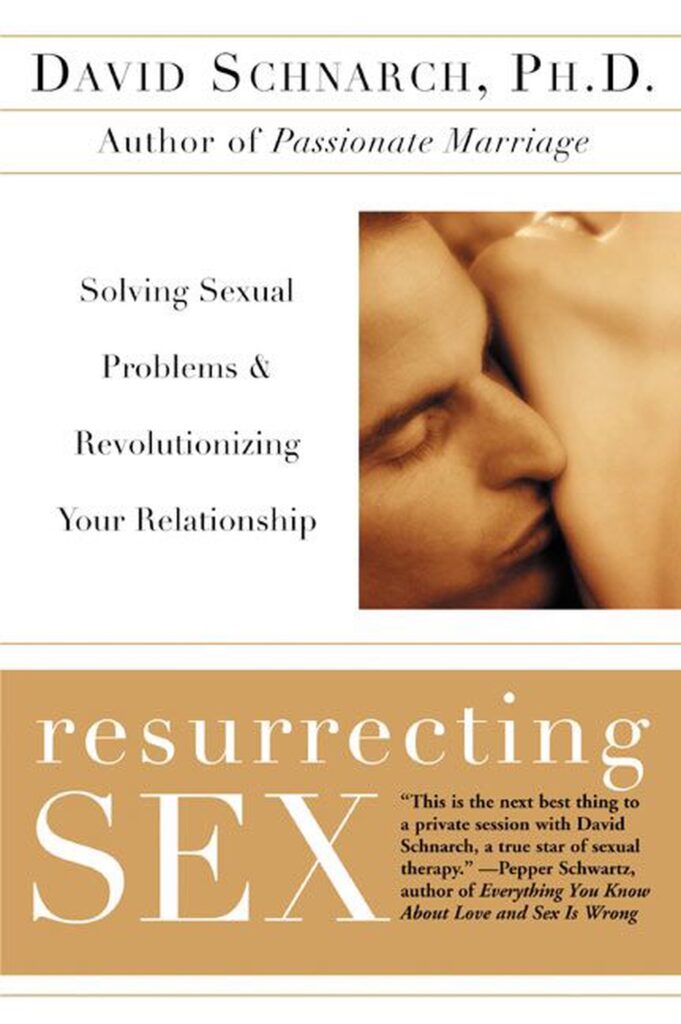Sharing my learnings from the book, Resurrecting Sex by David Schnarch
Resurrecting Sex by David Schnarch
Resurrecting Sex addresses all major sexual issues, including male erection problems such as rapid orgasm and delayed orgasm; women’s problems with arousal and lubrication, difficulty reaching orgasm, and low desire; full coverage of Viagra (for both men and women); and other sex-enhancing drugs and medical options. Rather than dwelling on sexual techniques, this sympathetic book shows how to cure the rejection, hostility, and emotional alienation that often accompany sexual problems. Its unique method helps couples develop the love, affection, and commitment that prevent divorce and strengthen families.

- Confronting sexual problems can be a catalyst for growth as a couple. It can also help you have the most intense sex of your lives!
- sex isn’t just about sex. Even when there are underlying physical or medical causes to sexual problems, your emotional connection with your partner can make or break your sexual experience.
- the journey toward resurrecting sex may shatter some of your illusions about relationships. To forge a deep sexual union and find true and meaningful peace within your relationship, you must be willing to be vulnerable and put your best foot forward.
- the Quantum Model investigates the causes of sexual function rather than dysfunction.
- Your body has two sexual response thresholds – one trigger point for initial sexual arousal via genital response, and another for orgasm.
- The three components of total stimulation are: receiving sensory stimulation, your body’s ability to respond, and your subjective emotions about what you’re feeling.
- many partners in emotionally committed relationships, regulated their anxiety in two ways. One was through the comfort-safety cycle, in which partners use their relationship to feel valued, wanted, and safe. The other thing that soothed their anxiety was their reflected sense of self within the relationship. That meant they depended on each other to confirm their identities and assure themselves of their self-worth
- emotional gridlock – meaning both partners arrived at a point at which accommodating one another didn’t reduce their respective anxieties.
- Analyzing the state of your relationship is a necessary part of resolving sexual issues. That means tolerating anxiety in the short term and fostering a growth cycle
- Rather than seeking emotional support from your partner, find validation by holding on to yourself.
- the best way to confront your partner is to confront yourself.
- Tolerating initial discomfort in the pursuit of relationship growth
- hold on to yourself by remaining nonreactive in the face of your partner’s anxiety or provocation.
- To solve any arousal problem, you must first be active in identifying your problem and its causes. Besides pain or physical difficulty, there are two other categories of arousal problems: insufficient stimulation, and emotions or thoughts that impede enjoyment. After you’ve identified the issue, develop and implement a treatment plan – and don’t limit yourself. While improving one dimension of your problem might be enough to raise your arousal threshold, you’re more likely to succeed if you approach the problem from multiple angles. Get a medical checkup for peace of mind
- Your issue may also be the quality of physical stimulation you’re giving or receiving. When you are emotionally detached from your partner, you may tune out and feel awkward receiving that person’s touch. Connecting physically requires the willingness to connect with your partner emotionally.
- Anxiety is the most common cause of orgasm interference, and it manifests in two ways. The first is that it can add to your stimulation – making you orgasm prematurely. Another way anxiety interferes with orgasm is by preventing you from reaching your orgasm threshold.
- Your sexual functioning has a lot to do with what’s going on in your head. Your goal is to break the connection in your mind between reaching your orgasm threshold and feeling inadequate. Start by opening yourself to your partner. Pay attention to what brings you to orgasm, and teach your partner the best way to stimulate you. You may reach orgasm more quickly in the short term, but eventually your tolerance will increase.
- The success of any medical treatments for sexual problems ultimately depends on your relationship.


Leave a Reply